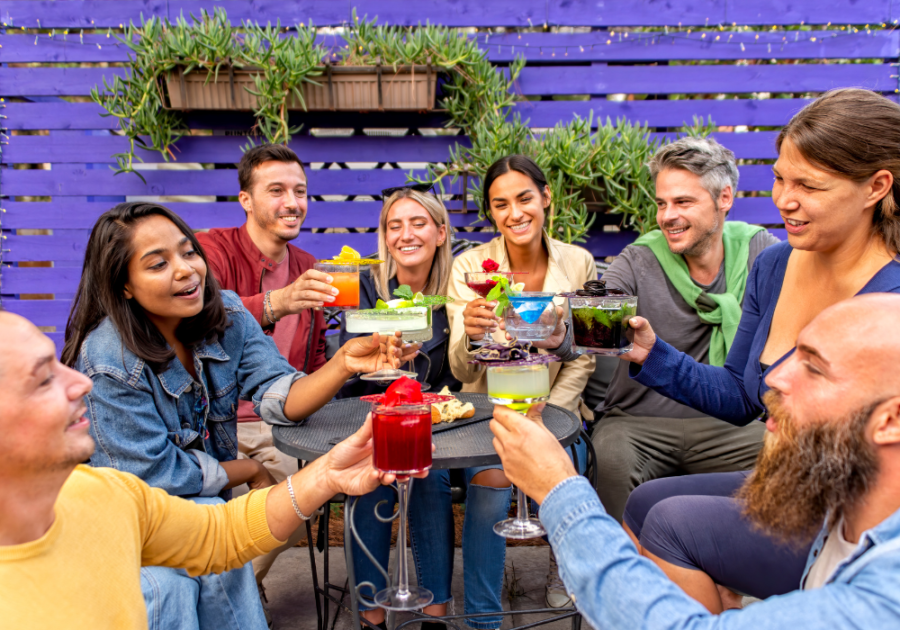Turning 30 can be a lonely experience, especially if you look around and realize your friend circle is smaller than it used to be.
But don’t despair!
While making new friends often takes more effort as an adult, it’s far from impossible with the right mindset and strategies.
The good news is that there are many ways to meet people and form meaningful connections, even in your 30s, 40s, and beyond.
With some creativity and effort, you can build the active social life you want and spark new friendships that will last for years to come.
Why Is It So Hard to Make New Friends in Your 30s?
Making new friends can be tough once you’re firmly settled into adulthood.
What makes it so hard to meet people and form new friendships in your 30s? A few key reasons:
- Your social circles are set – By 30, most people have established their core friend groups. You don’t have as many opportunities to easily meet new people as you did in school or college.
- You’re busy – Between work, relationships, and other responsibilities, your schedule is jam-packed. Finding time to nurture new friendships can be challenging.
- You’re comfortable with your routine – It’s tempting to just spend time with the people you already know versus putting yourself out there to make new connections.
- You’re pickier – In your 20s, making new friends was easy and carefree. Now, you may be more discerning and have higher standards for who you let into your circle.
- You’ve changed – Interests, priorities, perspectives – it’s natural for things to shift as you get older. But this can make it tougher to bond with others the way you once did.
The good news? While it takes effort, making meaningful new friendships is far from impossible, even as you settle into adulthood.
How to Make Friends in Your 30s: 17 Hacks for Expanding Your Tribe
While making new friends in adulthood has its challenges, it is absolutely possible with the right mindset and strategies.

If you’re feeling lonely or want to expand your social circle, here are 17 tactical friendship hacks to try out in your 30s. With some creativity and effort, you’ll be on your way to new, meaningful connections.
1. Join a club or group.
Clubs and groups centered around hobbies, interests, sports, or values are a great way to make new friends as an adult. When you’re doing activities you enjoy, you automatically have something in common with the other people there.
Attend regularly to get to know members, make conversation before or after meetings, and eventually suggest grabbing food or drinks together. Having a shared interest gives you an easy way to bond.
2. Take a class.
Adult education classes are full of like-minded people looking to learn something new. Whether it’s a cooking, art, language, or DIY skills class, you get to interact with others while building a new skill.
Smile and chat with the people sitting near you before or after class, and you may end up connecting with fellow students. If it feels natural, suggest forming a study group and turning classmates into friends.
3. Try a new hobby.
Starting a new hobby is a built-in opportunity to meet people. Look on Meetup.com for local groups related to activities that interest you, whether it’s hiking, photography, gardening, or playing an instrument.
You’ll immediately have something in common with fellow hobbyists to talk about. Attend gatherings regularly and suggest meeting up outside official events once you become familiar with members.
4. Get a dog and go to the park.
Dog owners are always looking to let their pups play together. If you get a dog, going to your local dog park is a simple way to meet fellow pet owners.
Chat while your dogs interact and get to know the other regulars. Exchanging numbers to plan doggy playdates can turn into real friendships over time. Even without a dog, you can strike up conversations about cute pups as an icebreaker.
5. Say yes to invitations.
The next time you get invited to a party, dinner, event, or gathering – even by casual acquaintances – say yes! Accepting invites helps you expand your network and meet new people within your existing circles.
By showing up, you increase the chances of hitting it off with someone new. Ask friends to introduce you to other friends-of-friends to keep branching out.
6. Connect with old friends.
Thanks to social media, it’s easier than ever to reconnect with old friends from your past. Search for old classmates, colleagues, or acquaintances on Facebook and send a friend request with a warm message about great memories.
Say you’d love to catch up in person sometime. Plan video calls to check in with long-distance friends. Reigniting old bonds can be immensely rewarding.
7. Smile and chat with neighbors.
Be friendly with the people who live nearby! Greet anyone you see in your building and neighborhood. Make pleasant small talk when you run into each other. Introduce yourself to those you see often.
Suggest getting together for a drink or potluck once you’re on friendlier terms. Neighbors make great friends as you’re likely to share local spots or need help watching each other’s place.
8. Volunteer for a cause you care about.
Volunteering is an uplifting way to meet people who share your values. Animal shelters, food banks, museums, libraries, community centers, places of worship, and more rely on volunteers.

Sign up to help out regularly, chat with fellow volunteers while working, and consider grabbing lunch or coffee together after shifts. Having a shared desire to do good helps friendships form naturally.
9. Strike up conversations in public.
While you’re in line at a coffee shop, waiting for the subway, or walking your dog, spark up friendly chats with strangers around you. Compliment someone’s dog or cool jacket, ask about a book they’re reading, or comment on an event happening around you.
Being open to interacting with people you encounter during your daily routine makes the world feel friendlier. Exchanging numbers to continue the conversation can lead to a new connection.
10. Explore your spiritual side.
If you’re spiritually inclined, places of worship provide community and introduce you to like-hearted people. Attend services and events to get to know fellow devotees.
Having shared beliefs and values forms an instant connection. Introduce yourself to new faces and invite people you click with to community activities outside scheduled services.
11. Join professional organizations.
Professional associations related to your industry are full of like-minded individuals. Attend mixers, talks, and events to exchange ideas while expanding your network. Set a goal to have at least a brief chat with a few new people at each event.
Exchanging business cards makes follow-up easier. Offer mentorship to younger members to foster a meaningful connection.
12. Try travel meetups.
For the adventure-seekers out there, travel meetup groups are a great way to explore new places with cool people. Search sites like Meetup.com for local travel groups or start your own. You already have travel interests in common with fellow group members.
Bond over your excitement about upcoming trips during planning meetups, then form deeper connections during the shared travel experience.
13. Put yourself out there online.
The internet offers myriad ways to connect with potential new friends. Join local Facebook groups centered around your interests or location.
Try Bumble BFF to find friends who like the same activities as you. Look for online groups related to any niche hobbies or identities. Respond to people’s posts, comments, and photos to strike up virtual conversations that could lead to in-person hangs.
14. Host game/movie/potluck nights.
Bring new people together by hosting casual get-togethers at your home. A game night, film screening, crafting afternoon, or potluck dinner are great low-pressure ways for guests to mingle.
Reach out to acquaintances you’d like to know better and invite them to bring a friend, too. Provide food, activities, and a welcoming atmosphere. Follow up with attendees afterward to keep the momentum going.
15. Accept help from friends and family.
Ask friends you already have and family members to connect you with their friends or other contacts. They may have coworkers, neighbors, or former classmates who could be a great match for friendship.
Don’t be shy to enlist your existing network to set you up on friend “dates.” Say yes when your social connectors invite you along to group activities.
16. Make the first move.
Once you’ve identified potential friend candidates, don’t wait for them to make the first move – put yourself out there first! Take the lead by asking acquaintances to grab a coffee, inviting them to do an activity you both enjoy or setting up a casual hang at your place.
Many people may be just as eager to make a new connection but also feel shy about taking the first step.

17. Stay open-minded and positive.
Approach making new friends with an open heart and growth mindset. Don’t write people off too quickly based on surface differences. Look for common ground. Focus on listening, asking questions, and learning about others. Remind yourself that befriending quality people takes time. Maintain positivity, put yourself out there, and give friendships a chance to blossom.
How to Meet People in Your 30s: 15 of the Best Places to Encounter New People
Expanding your social circle often comes down to putting yourself in the right environment to meet potential new friends. But where exactly are the best places to connect with people and forge meaningful bonds as an adult? Here are 15 prime spots for meeting folks when you’re looking to make new connections:
1. Adult education classes. Enrolling in cooking, art, language, or skill-building classes exposes you to like-minded adults. Chatting before and after class can lead to study sessions and friendships.
2. The gym or fitness classes. Gyms are filled with people focused on bettering themselves. Strike up conversations about equipment, classes, or workout strategies. Suggest being gym buddies.
3. Volunteer activities. Giving back, such as at animal shelters, museums, or community centers, brings you together with kind-hearted people. Bond while doing good work.
4. Neighborhood cafes. Coffee shops and casual cafes are comfortable spots for chatting with strangers or running into neighbors. Become a regular.
5. Dog parks. Fellow pet owners are always happy to let their dogs play together. Doggy playdates can turn into real human friendships.
6. Professional associations and mixers. People in your field are natural friendship candidates with shared interests and values.
7. Alumni events. Reconnecting with fellow alumni from your college or high school fosters instant camaraderie.
8. Networking happy hours. Mixers designed for meeting new people make introductions easy and comfortable. Follow up with any promising connections.
9. Religious services or gatherings. Places of worship provide built-in community and introduce you to people who share your faith.
10. Sports leagues and clubs. Bond with people who enjoy the same sports and activities as you do. Conversation flows easily.
11. Travel meetup groups. Exploring new places with other adventurous spirits allows friendships to form organically.
12. Local Facebook groups. Virtual communities centered around your city, interests, or identity help you meet people online and then offline.
13. Bumble BFF. This app lets you match with potential friends who enjoy similar activities and interests.
14. Parties of friends and family. Ask loved ones to introduce you to their friends or bring you along to group events.
15. Online niche hobby groups. Connecting virtually around a niche interest like gaming or knitting can lead to in-person hangouts.
The opportunities to meet people abound once you start venturing out. Being proactive while doing activities you enjoy will lead to the human connections you seek.
How Many Friends Is Normal at 30?
When you reach your 30s, you may look around and realize your friend group is smaller than it was in your wild 20s. But how many friends is considered a normal amount as you settle into adulthood?
While there is no magic number, studies show the average 30-year-old has anywhere between 2 and 5 close friendships. This inner circle is supplemented by 10 to 15 broader friendships and acquaintances.
The key is not the quantity of friends but rather the quality of those bonds and whether your social life feels fulfilling. Focus on nurturing the connections that matter most to you.
Can You Make Friends at 35?
You’re never too old to make new friends! While your youth may have revolved around large friend groups, many adults find that just a few meaningful friendships are enough.
The good news is that it’s absolutely possible to meet quality people and form strong bonds in your mid-30s and beyond. In fact, studies show that the majority of adults report making at least one new close friend during midlife.
Don’t worry so much about the number of friends – focus instead on building relationships that enrich your life at any age.
More Related Articles
201 Put a Finger Down Questions For Your Friends
100 Side-Splitting Funny Jokes For Your Friends
Can You Go From Friends To Lovers
How Do Introverts Make Friends in Their 30s?
Making new friends can be especially challenging for introverts. While you gain energy from solo activities, finding people you click with requires putting yourself out there. However, there are ways to strategically stretch beyond your comfort zone so introversion doesn’t hold you back socially.
- Try low-pressure social activities that align with your interests, like book clubs or hobbyist meetups. You already have built-in conversation starters.
- Get out of the house regularly to places like coffee shops and community events. More exposure means more opportunities to connect.
- Ask friends to introduce you to their friendship circles to take the pressure off making first contact.
- Take the initiative to plan low-key hangouts like going to a museum or trying a new restaurant. You control the vibe.
- Say yes when invited places, even if you’re inclined to decline. Each yes expands your social circle.
- Set a goal of approaching two new people in a social setting. That’s enough to potentially spark a friendship without overwhelming you.
The key for introverts is balancing intentional social time with ample solo recharge time. With strategy, self-awareness, and courage, making meaningful new friends is possible.
How Do You Beat Loneliness When You Have No Friends?
Finding yourself truly alone and isolated socially can be painful. Human connection is a fundamental need. When you don’t have any close friends, how can you beat feelings of loneliness? While making new friends takes effort, there are ways to feel less lonely in the meantime:
Reach Out to Acquaintances
Even loose ties to coworkers, neighbors, or old classmates. Suggest meeting up one-on-one to turn acquaintances into friends.
Join groups or classes focused on hobbies you enjoy, from sports to arts to volunteering. Keep showing up to get to know people.
Places of worship, community centers, and support groups provide a sense of community when you show up regularly.
Adopt a Pet
Caring for a pet provides unconditional love and companionship. Going to a dog park creates opportunities to bond with fellow pet owners.
Spend Time with Family
Make an effort to see supportive family members more often. Plan video calls with relatives who live far away.
Focus on Self-Care
Fill your time with activities that nourish you, like exercise, reading, and cooking your favorite recipes.
The pain of loneliness may not disappear overnight, but reaching out and nourishing yourself can help until you rebuild your social circle. Don’t give up hope on finding meaningful friendships.
Final Thoughts
Making new friends in adulthood has its challenges, but it is absolutely achievable if you put yourself out there. Choose exciting activities and environments, take social risks, and nurture budding connections. Approaching new friendships with courage, creativity, and open-mindedness will help you build the social circle that enriches your life.














